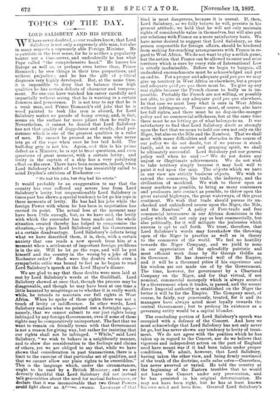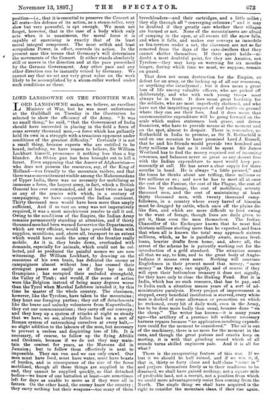TOPICS OF THE DAY.
LORD SALISBURY AND HIS SPEECH.
WE have never doubted, as our readers know, that Lord Salisbury is not only a supremely able man, but also in many respects a supremely able Foreign Minister. He is patriotic in the best sense, for he is neither a popularity hunter nor a time-server, and undoubtedly he has what Pope called "the comprehensive head." He knows his Europe as well as, or perhaps even better than, Prince Bismarck; he sees things in their true proportions, and without prejudice ; and he has the gift of political diagnosis very highly developed. But, at the same time, it is impossible to deny that to balance these high qualities he has certain defects of character and tempera- ment. No one can have watched his career carefully and impartially without seeing that he is wanting in a certain firmness and persistence. It is not true to say that he is a weak man, and Prince Bismarck's old joke that he is wood painted to look like iron is absurd, for Lord Salisbury makes no parade of being strong, and, in fact, seems on the surface far more pliant than he really is. Nevertheless, it cannot be denied that Lord Salisbury has not that quality of doggedness and steady, dead per- sistence which is one of the greatest qualities in a ruler of men. He cannot be praised as the man who never lets go of the rope when once he has laid hold. The bull-dog grip is not his. Again, and this is his prime defect as a Minister, he is apt to treat questions, and even questions of great moment, with a certain levity ; and levity in the captain of a ship has a very paralysing effect on the crew. There have been moments, indeed, when Lord Salisbury's habit of levity has irresistibly called to mind Dryden's criticism of Rochester :— " He had his joke, but they had his estate."
It would probably be an exaggeration to say that the country has ever suffered any severe loss from Lord Salisbury's levity, but unquestionably Lord Salisbury in times past has shown a special tendency to let go his rope in these moments of levity. He has had his joke while the foreign Power with whom he has been in negotiation has carried its point. The actual loss at the moment may have been little enough, but, as we have said, the levity with which the surrender has been made and the whole situation created thereby has helped to compromise the situation,—to place Lord Salisbury and his Government at a certain disadvantage. Lord Salisbury's defects being what we have described them, it is, then, with a certain anxiety that one reads a new speech from him at a moment when a settlement of important foreign problems is in the air. Will he let go the rope, and will he put himself and the country in the wrong by a joke of the Rochester order ? Such were the doubts which even a sympathetic critic was bound to feel as he began to read Lord Salisbury's speech at the Lord Mayor's dinner.
We are glad to say that these doubts were soon laid at rest by Lord Salisbury's words at the Guildhall. Lord Salisbury showed at once that, though the process may be disagreeable, and though he may have been at one time a little haunted by misgivings as to whether it is really worth while, he intends to maintain our full rights in West .Africa. When be spoke of those rights there was not a touch of levity or indifference. In other words, Lord Salisbury realises what we pointed out a fortnight ago,— namely, that we cannot submit to our just rights being infringed by any foreign Government, even if some of these rights may be comparatively unimportant. The fact that we want to remain on friendly terms with that Government is not a reason for giving way, but rather for insisting that our rights shall not be infringed. "While," said Lord Salisbury, "we wish to behave in a neighbourly manner, and to show due consideration to the feelings and claims of others, yet we are obliged to say that, while we have shown that consideration in past transactions, there is a limit to the exercise of that particular set of qualities, and that we cannot allow our plain rights to be overridden." This is the language which, under the circumstances, ought to be used by a British Minister ; and we are devoutly thankful that Lord Salisbury did not instead talk generalities about the need for mutual forbearance, or declare that it was inconceivable that two Great Powers amid fight about an Af-'euln swamp. Lanctuage of that kind is most dangerous, because it is unreal. If, then, Lord Salisbury, as we fully believe he will, persists in his present attitude, we hold that he will not only maintain rights of considerable value in themselves, but will also put our relations with France on a more satisfactory basis. We have never desired to suggest that Lord Salisbury, as the person responsible for foreign affairs, should be hindered from making far-reaching arrangements with France in re- gard to West Africa. We do not want to play a selfish game, but the notion that France can be allowed to enter and seize territory which is ours by every rule of International Law is utterly inadmissible. Before we begin to bargain, all undoubted encroachments must be acknowledged and put an end to. For a proper and adequate quid pro quo we may give up territory in West Africa or elsewhere, but a proper and adequate quid pro quo there must be. To give up any real rights because the French choose to bully us is im- possible. Probably the French are not willing, or possibly not able, to give us any adequate quid pro quo elsewhere. In that case we must keep what is ours in West Africa without infringement. France must, of course, also have- her full rights, and there must be no dog-in-the-manger policy and no commercial selfishness, but at the same time there must be no letting go of what belongs to us. It was- satisfactory to find that Lord Salisbury dwelt so strongly upon the fact that we mean to hold our own not only on the Niger, but also on the Nile and the Zambesi. That we shall meet with many difficulties and obstacles in the course of our policy we do not doubt, but if we pursue it stead- fastly, and in no narrow and grasping spirit, we shall be ultimately successful. Lord Salisbury put our general. policy well when be said :—" We do not desire any unjust or illegitimate achievements. We do not wish to take territory simply because it may look well to paint it red upon the map. The objects which we have in our view are strictly business objects. We wish to extend the commerce, the trade, the industry, and the civilisation of mankind. We wish to throw open as many markets as possible, to bring as many consumers and producers into contact as possible, to throw open the great natural highways, the great waterways, of this great continent. We wish that trade should pursue its un- checked and unhindered course upon the Niger, the Nile, and the Zambesi." A policy of Free-trade and free commercial intercourse in our African dominions is the policy which will not only pay us best commercially, but also politically, for it will mitigate the jealousies which success is apt to call forth. We trust, therefore, that Lord Salisbury's words may foreshadow the throwing open of the Niger in practice as well as in theory to the commerce of the world. We feel no hostility towards the Niger Company, and we yield to none in our appreciation of the splendidly patriotic and most efficient work done by Sir George Goldie as its Governor. He has deserved well of the Empire, and it will be a thousand pities if his experience and his wisdom are not made use of by the Government. The time, however, for government by a Chartered Company on the Niger, and for that virtual, if not nominal, commercial monopoly which is always secured by a Government when it trades, is passed, and the sooner direct Imperial authority is established on the Niger the better it will be for the Empire. The Company must, a course, be fairly, nay generously, treated, for it and its managers have always acted most loyally towards the central Government ; but to prolong its existence as a governing entity would be a capital blunder.
The concluding portion of Lord Salisbury's speech was occupied with a defence of the Concert. And here we must acknowledge that Lord Salisbury has not only never let go, but has never shown any tendency to levity of treat- ment. We do not agree with the position which he has taken up in regard to the Concert, nor do we believe that vigorous and independent action on the part of England need have meant war if it had been taken under proper conditions. We admit, however, that Lord Salisbury, having taken the other view, and being firmly convinced of the truth of the doctrine, nulla Bolus extra—Concertum, has never swerved or varied. He told the country at the beginning of the Eastern troubles that he would not leave the Concert under any provocation, and he has persisted in his original determination. He may not have been right, but he has at least known his own mind and been firm. Granted Lord Salisbury's position—i.e., that it is essential to preserve the Concert at all costs—his defence of its action, as a steam-roller, very slow but very powerful, is apt enough. We must not forget, however, that in the case of a body which only acts when it is unanimous, the moral force it is capable of exercising is exactly that of its least moral integral component The most selfish and least scrupulous Power, in effect, controls its action. In the present ease this means that Germany's will determines the movements of the Concert. It either stands absolutely still or moves in the direction and at the pace prescribed by the German Government. Any other pace and any other direction can be instantly vetoed by Germany. We cannot say that we set any very great value on the work likely to be accomplished by a steam-roller worked under such conditions as these.







































 Previous page
Previous page